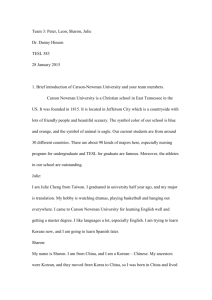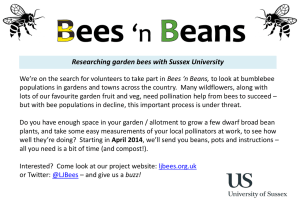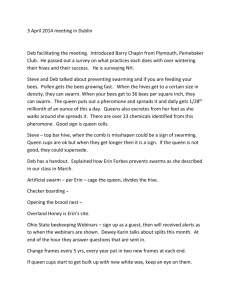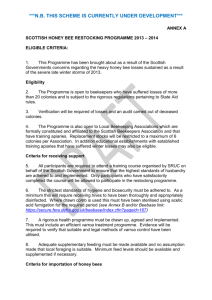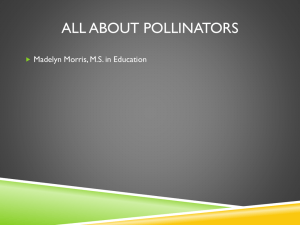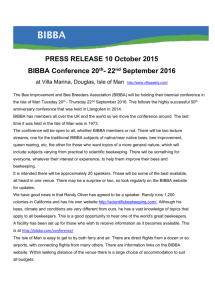MS WORD - Tennessee Beekeepers Association
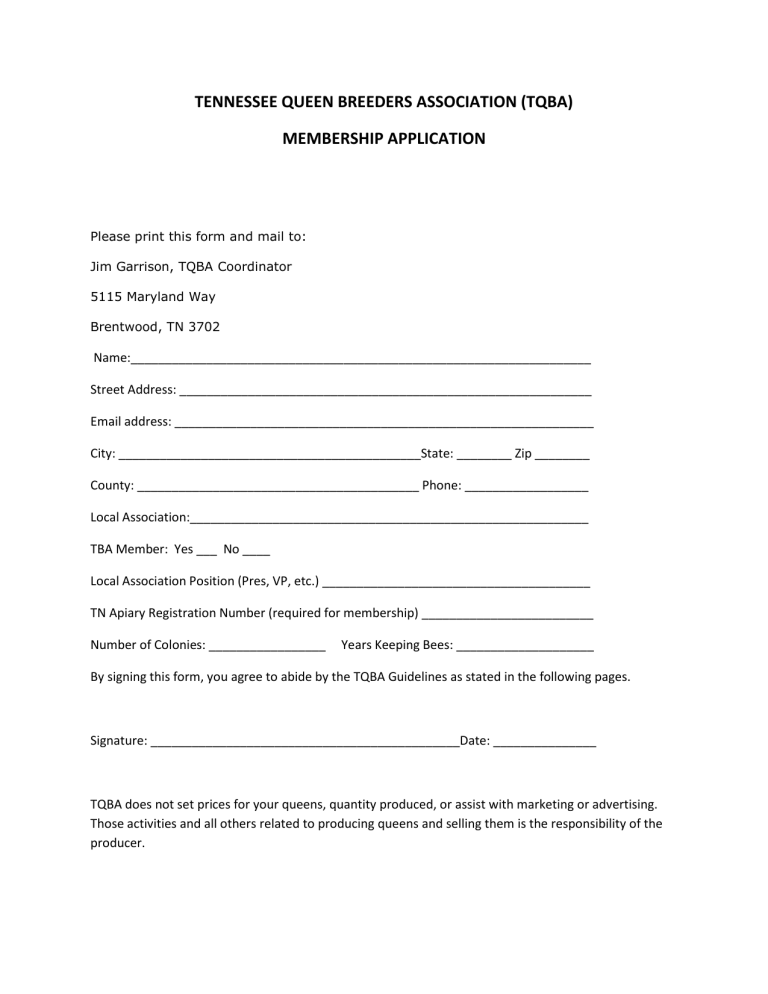
TENNESSEE QUEEN BREEDERS ASSOCIATION (TQBA)
MEMBERSHIP APPLICATION
Please print this form and mail to:
Jim Garrison, TQBA Coordinator
5115 Maryland Way
Brentwood, TN 3702
Name:___________________________________________________________________
Street Address: ____________________________________________________________
Email address: _____________________________________________________________
City: ____________________________________________State: ________ Zip ________
County: _________________________________________ Phone: __________________
Local Association:__________________________________________________________
TBA Member: Yes ___ No ____
Local Association Position (Pres, VP, etc.) _______________________________________
TN Apiary Registration Number (required for membership) _________________________
Number of Colonies: _________________ Years Keeping Bees: ____________________
By signing this form, you agree to abide by the TQBA Guidelines as stated in the following pages.
Signature: _____________________________________________Date: _______________
TQBA does not set prices for your queens, quantity produced, or assist with marketing or advertising.
Those activities and all others related to producing queens and selling them is the responsibility of the producer.
Tennessee Queen Breeders Association (TQBA)
The TQBA encourages all potential breeders to work towards joining the association. Our requirements are not to prohibit membership. It is to provide the highest quality product to those who are seeking queens and bees from the
TQBA.
This organization was originated via a grant from the Tennessee Department of Agriculture. The Tennessee
Beekeepers Association (TBA) is responsible for setting up this program under the direction of the current TBA
President, Jim Garrison, and the State Apiarist, Mike Studer. We have had many requests to join the Tennessee
Queen Rearing Association and begin this program. Many are highly motivated beekeepers who are starting on their journey of becoming great breeders. TQBA members encourage and direct new breeders as much as they can.
Our membership is made up of beekeepers who have expertise, knowledge, and have spent the time perpetuating a queen line and genetics that the state of Tennessee, in particular, desires. For a member to be added, we want to assure that for those calling upon our membership, that they will be dealing with a true Tennessee breeder who produces the best stock possible. The TQBA is not a research association. Our sole purpose is to produce quality
Tennessee Queens for use in the State of Tennessee, or other areas, as the need dictates. Some of our members have been breeding Tennessee queens that are acclimatized and survivor stock bees for years. While our two requirements are a minimum standard for consideration, we are very selective on membership. This is not about listing as many "queen producers" as possible. But offering you the best "queen breeders" possible. And we want the bee community to know that when they are contacting a member of the T Q BA, they are contacting a supplier with the best product possible.
There are two requirements to join membership in the TQBA.
1) Maintain a minimum of 25 hives. This is to ensure a standard for selection, drone saturation, and production levels.
2) Maintain and perpetuate a queen line for a minimum of two years. Many breeders buy a breeder queen every year from the same source. What results are first generation daughters without any advancement of traits desirable in regional or local conditions. We strive for our members to raise queens from lines showing traits capable of coping with local or regional environmental conditions.
Requirements to remove a member from membership in the TQBA.
1) A member can only be forcibly removed from membership for Violation of TQBA membership code of conduct (to be determined by the membership at the initial formation meeting of TQBA) or violating quality control standards (to be determined by the membership at the initial formation meeting of TQBA) by a formal hearing in front of the TQBA Board of Directors.
The TQBA was formed in 2011 by a group of Tennessee beekeepers who had a desire for raising quality queens specifically for Tennessee and our various climates. This association's initial goal was to help those small to midlevel queen operations with support on a broader regional scale and to pool knowledge from a wide range of beekeepers. Many of our members also assist and take part in other queen rearing programs
.
What is the purpose of the TQBA?
The idea for the TQBA is to help the growing segment of Tennessee beekeepers and queen breeders come together and work as a unit to be better breeders, share ideas, exchange genetics, strengthen the gene pool, allow the local beekeeping communities to buy from Tennessee breeders, and maintain a genetic pool unaffected by AHB, both now and in the future.
In order to provide a quality product to Tennessee beekeepers TQBA members will strive to select for the following traits when selecting breeder queens:
1) Survivability in Tennessee
2) Maximum Honey production
3) Non-Aggressive Traits
4) Good Hygienic traits
5) Good Solid Brood pattern and production
6) Gentleness
7) Resistance to pests and diseases
8) Reduced swarming behavior
In order to provide a quality product to Tennessee beekeepers TQBA members will strive to select against the following traits when selecting breeder queens:
1) Aggressive Traits
2) Swarming behavior
3) Spotty Brood pattern and production
4) Overly Defensive Behavior
5) Susceptibility to pests and diseases
What states are included?
The membership of TQBA consists only of residents of the State of Tennessee or nonresident members of the
Tennessee Beekeeper’s Association, both residents and non residents must have apiaries in the State of Tennessee that are registered with the Tennessee Department of Agriculture, are fully compliant with the Tennessee Apiary
Act, and agree to abide by the guidelines set forth herein.
TQBA benefits to customers
Knowing that you are selecting bees from a breeder striving to achieve the highest quality queens and genetics.
TQBA members are working to deal with problems associated with over-wintering honey bees in the Tennessee and climates similar to those in the state. They provide a source for the highest quality, selectively bred, localized, acclimatized, and survivor stock honey bee genetics available to Tennessee Beekeepers.
TQBA members are urged to participate in an annual queen exchange
The queen exchange benefits are:
1) Allows members to exchange genetic stock from climates and regions similar to their own. Having a pool of likeminded beekeepers, where new sources for stock can be collected is important for reasons such as hybrid vigor and disease control.
2) Allows the members of the TQBA to evaluate other breeder's queens on a wide range of criteria. Having other members give honest confidential feedback allows the breeder to improve his/her operation and quality of stock.
This further benefits the beekeeping community by TQBA members providing better queens.
Hygienic Testing Your Honey Bees
Where we are are now:
Over the past 10-15 years, hygienic testing of honey bees have revealed that the average bees across the country have increased resistance to varroa mites. This may be due to better breeding efforts on the part of the bee industry, and also the natural selection process at work in feral colonies.
Many are working hard to speed up the hygienic selection process of the honey bee. Mites have been a major problem for over twenty years now. And the faster we get to a point where bees can survive without chemical and non-chemical treatments, and survive on their own without beekeeper assistance, the better for all. Some have been keeping bees without traditional mite treatments for many years now. But losing an acceptable winter loss is probably built into their operation. Hopefully one day, no losses due to varroa mites will be the norm for all beekeepers.
Freeze killed brood hygienic testing:
This hygienic test involves freezing a portion of comb (approx. 100-150 cells) taken from the hive and placed into a freezer. Freeze the comb for 24 hours. Then you replace the comb back into the comb "hole" you created when you cut out the comb. Most indicate a 48 hour testing time in determining the hygienic behavior of your bees. Previous testing has set the standard of 95% of the previously frozen cells being cleaned out for a good hygienic colony.
Using liquid nitrogen:
This hygienic test involves the same procedure as the comb freeze method but instead of cutting out the comb section, you use a three inch cylinder pushed into the comb, then pour liquid nitrogen onto the comb, freezing the brood. You must be certain to use enough liquid nitrogen to kill the brood. After replacing the frame back in the hive and waiting 48 hours, you then would count the number of cells removed from the three inch circle. 95% is the standard for a good hygienic hive. You can do a simple internet search for detailed past testing and full procedures on liquid nitrogen testing.
Other Considerations:
Many beekeepers are not going to buy liquid nitrogen or take the time to cut chunks of comb out of their frames.
And for the backyard beekeeper with a few hives and just wanting to raise a few queens, the following are a few suggestions that make selecting the best queen you have, still possible. They may not focus on the same genetic traits the bees display in the comb freeze and liquid nitrogen tests, but help select bees that still use effective means to survive.
Paper Towel Testing:
Years ago, when we were playing around with FGMO (Food Grade Mineral Oil) for mite control, the protocol called for soaking cotton cords in FGMO and placing them on the top of the frames. We observed three distinct reactions from different hives. 1) The bees would ignore the cords. 2) The bees would coat the cords with propolis.
3) The bees would shred the cotton cords, drag them through the hive, and shove them outside the front door. We do not use FGMO fogging (or the cords) after our initial testing of the claims, but have continued to use our experience in our queen evaluation procedures. What we do now is soak paper towels (They do not have to be dripping wet) in
Canola oil (shown to have certain qualities and benefits to bees) that has some menthol or thymol crystals dissolved in the liquid. We place one paper towel on the top of the frame (middle of the brood chamber) in each colony being tested, and wait 24 hours. We want bees that exhibit the traits displayed (as in #3 mentioned above) by the removal of the paper towel as soon as possible.
Beekeepers also can evaluate their hives on many other factors that affect hive health. Every spring we have queen evaluation days. This is a time that local beekeepers assist in helping us select breeders for the coming season. Part of the criteria we look at in selecting queens for further consideration such items as:
Mite counts
. Mite counts are an "after the fact" indication of hygienic and other desired traits that you should seek for your bees. Colonies that have good grooming, hygienic traits, and overall strong genetics, have few mites and can cope with mite pressure and other issues. One mite count alone, means nothing. It is a snapshot of the varroa mite level for a very particular period of time. Many factors affect mites counts. The best use of mite counts is when you can use multiple counts at intervals such as every two weeks, to get a broader idea of what is happening in the hive. Is the mite counts trending higher, lower, or staying the same? Only then can you see how your bees are dealing with mites, and take additional steps of your IPM plan.
Clean bottom boards
.
We want bees who display good housekeeping traits. Indications such as a very clean bottom board, has positive qualities. While researchers have isolated genes being in control of specific behaviors of honey bees, good grooming bees are usually good house cleaners, and many good house cleaners are good at detecting infected mite larvae in the brood comb. You should seek bees to propagate that display as many of these traits as possible.
P ests
. Colonies that show significant (as determined by the TQBA board) wax moth, Varroa mite or small hive beetle infestations during spring evaluations will automatically be disqualified as queen or drone breeder selection.
Even if you have just a handful of colonies, yet want to raise a few queens, selecting from your best colonies and genetics is in your best interest and benefits the honey bees. Too many beekeepers are still trying to save each and every hive through chemical treatments and other "band-aid" approaches. Some have commented that if we would have had no treatments to use on varroa mites from the very beginning, we would have been in a much better place today after building off the survivor stock.
We do not want to suggest you should let your bees die. Instead of waiting for colonies to die over winter, a much better approach would be replacing weak genetics with better queen stock, many times from your own operation.
We must make efforts in building a better genetic pool and realize that there is a difference in genetics, breeding operations, and the ability of certain strains to handle mites and other disease.
